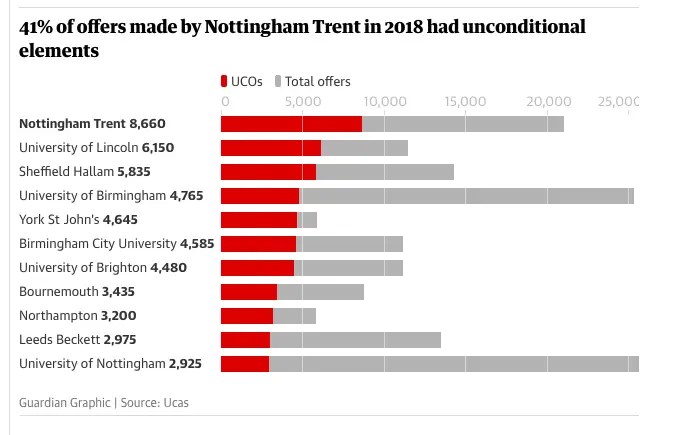Last Updated on January 31, 2019 by Karl Thompson
1 in 3 sixth formers now receive at least one unconditional offer from a university. 117 000 students received a university offer with at least one unconditional element last year, compared to just 3000 five years earlier. (Guardian article, Jan 31st 2018).
And according to the latest UCAS figures, there are 20 universities which are fuelling the trend. Nottingham Trent is at the top of the list – 40% of its offers last year were unconditional.
Russel Group universities are much less likely to make unconditional offers, although of these Birmingham has an 11% unconditional rate.
Of particular concern to UCAS is the rise of so called ‘conditional unconditional offers’ which is where universities make an unconditional offer to a student so long as they make that university their first choice.
This actually continues a trend I blogged about last year. It seems the trend is intensifying!
Why the increase in unconditional offers?
There are lots of possible reasons:
At root we have a competitive, free-market higher education system: universities have to compete for students and making unconditional offers is one way universities can make themselves more appealing (I mean, who wants to actually have pass exams to get in?!)
It could also be due to the increasing amount of apprenticeships looking more appealing than university. There are hundreds of thousands of these after all and surely a 1-2 year apprenticeship where you actually paid is going to be more appealing than a 3 year degree and £30K of debt at the end?
Finally, it’s worth noting that unconditional offers are more likely to be handed out by the lower end universities, most of the Russel Group universities make very few unconditional offers, and students generally have to pass their exams to get in.
Problems with unconditional offers…
As I see it, there are three main problems…
Firstly, these may not be in the students’ best interest. They may reduce stress for you in your exam year, but they may lead you into a three year degree that has little value at the end of it. Worse, an unconditional offer may attract you to doing the wrong degree and saddle you with £9K of debt after one year with nothing to show for it.
Secondly – it’s likely to have a detrimental affect on school and college results that the more unconditional offers their students get then the worse the A level results are going to be – why work when you’re going to get in anyway?
Thirdly, it doesn’t seem fair on those students who get standard offers….. at least not in the final exam year when they’re under stress. In the long run, these students may be better off with better A-levels and having got into better universities!
links to A-level sociology
This material should be useful in criticising New Right views of education.
Could this be a topic for a ‘horrible’ methods in context question: look at the strengths and limitations of ‘A method’ for researching the increase in unconditional university offers’ – it’s horrible, but VERY relevant to the majority of sociology students.
Final thoughts
I say either ban unconditional offers absolutely, or ration them to a handful per institution, which have to be ‘sponsored’ by the pastoral team, and backed up with hard evidence that there is a need for them (due to severe deprivation, abuse, emotional issues), in the name of equality of educational opportunity.
Also, it’s 2019 now, time for 18 year olds to apply to uni AFTER they get their A-levels results in mid-August?
Sources

